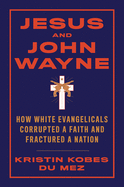
Jesus and John Wayne, Kristin Kobes Du Mez's urgent, sharp-elbowed survey of the last half-century of white American evangelicalism, offers a persuasive answer to this familiar question: How could evangelical leaders who thundered against the personal immorality of Bill Clinton in the 1990s ("Character DOES matter," insisted Focus on the Family's James Dobson) embrace the candidacy of Donald Trump two decades later? (Dobson on Trump: "Cut him some slack.")
Drawing on marital guides, purity texts and the popular, non-doctrinal literature for sale in thousands of Christian bookstores in the U.S., Du Mez (A New Gospel for Women), a historian of gender and faith, demonstrates how the evangelical movement has, since the Vietnam era, valorized an image of pugnacious masculinity at odds with traditional depictions of a cheek-turning Christ. Du Mez illuminates, through the words of leaders like Dobson, Tim LaHaye, Mark Driscoll and Jerry Falwell, the movement's aggrieved search for models of manliness in an America that Driscoll would call "pussified." Besides examining how the evangelical ideal of masculinity shifted from John Wayne to Mel Gibson to Duck Dynasty to Trump, Jesus and John Wayne charts the rise of what one could call a Christian Culture Industrial Complex, an empire of publishers, preachers and mailing-list polemicists furious at feminists and threats to "family values." Those same outrages would later power the nominally secular broadcasts of Rush Limbaugh and Fox News. The book's subtitle, How White Evangelicals Corrupted a Faith and Fractured a Nation, suggests an excoriating approach, but Du Mez sticks close to the texts and the history, pinning down the evolution of attitudes rather than arguing with them. --Alan Scherstuhl, freelance writer and editor

